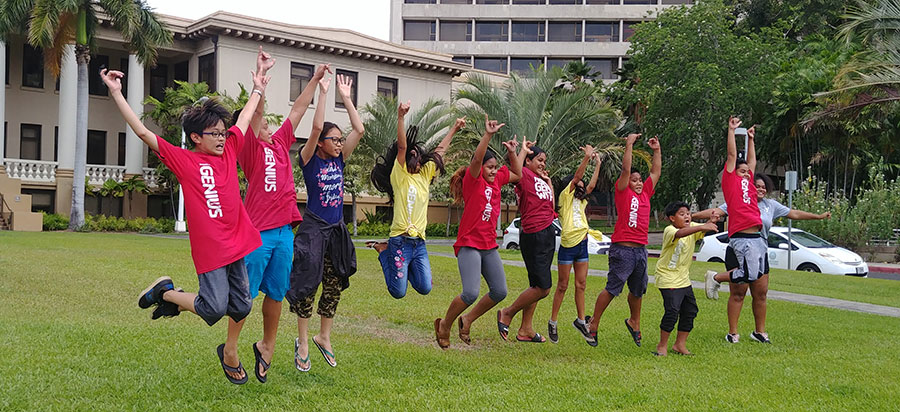Project Snapshot
In spring 2019, The Opportunity Project spearheaded a process in partnership with Tulsa Public Schools (TPS), youth-serving nonprofits, and local foundations, to develop a renewed vision for summer learning in Tulsa. The Opportunity Project hired BellXcel and SCRI (referred to as SCRI in this brief) to support this work by answering critical questions around the summertime needs of students and families and Tulsa’s existing capacity and resources. After gathering data from key stakeholders, SCRI recommended a set of coordinated actions designed to build new proof points for summer learning as part of a sustainable community-wide system.
The Backstory
TPS enrolls nearly 40,000 students, over three-quarters of whom are considered economically disadvantaged. In the 2018-2019 school year across third through eighth grade, between 35% and 61% of Tulsa students scored “Below Basic” on the ELA Oklahoma State Testing Program assessment. In math, the deficit was even larger: between 46% and 68% of students scored “Below Basic” on the state test. In some cases, Tulsa students lagged behind the state’s performance by over 20 percentage points.
Digging into the district’s data, the TPS Data Strategy and Analytics Team found that students lost an average of 40% of their school-year gains over the summer. In this difficult finding, local leaders saw a clear opportunity to reverse the summer slide and boost student success.
To better understand the summer landscape, Impact Tulsa, a collective impact hub of over 300 organizations, collected data in 2017 on the availability of summer programs. The responses revealed multiple ways to improve the reach and effectiveness of summer programs. First, out of more than 100 programs, less than 20% were offered at no cost. Further, most summer offerings were week-long programs that required parents to sign up for individual weeks—few programs ran for 20 consecutive days or longer. Finally, most programs were not academic in nature, instead offering sports and arts enrichment activities.
The leaders at the table knew that increased access to the right kind of summer program could make a difference. Based on the needs of students and complementary initiatives underway, the planning team nominated two schools for a summer learning pilot: Walt Whitman Elementary and McClure Elementary. Before jumping into planning, local leaders asked SCRI to gather the perspectives of a variety of key stakeholders.
The Approach
Over the course of several weeks, SCRI and The Opportunity Project interviewed 13 key community stakeholders, including staff from TPS, local community partners, funders, and summer providers.
Interview questions focused on several areas:
- stakeholders’ current roles in offering and/or supporting summer programming
- perceptions of the greatest needs for Tulsa families during the summer
- current demand for summer programming in Tulsa
- stakeholders’ vision for high-quality summer learning
- additional thoughts about the Summer 2020 pilot
In addition, SCRI reviewed data from Impact Tulsa and relevant research to ensure that all recommendations were grounded in the local context and evidence base for summer learning programs and systems. Finally, SCRI visited five summer programs in 2019 to better understand the local landscape and bring the data to life.
Key Findings
- The community lacks data on demand for summer learning, and in previous years, programs were under-enrolled. For example, out of 198 students auto-enrolled for summer learning at McClure Elementary in 2019, only 39 (less than 20%) attended. At Whitman, 31 out of 111 (28%) attended.
- Programs can better meet the needs of families by starting operations closer to the end of the school year and providing daily meals and transportation.
- Families want programs that include but go beyond academics to focus on social-emotional learning and value hands-on and culturally rich experiences.
- Marketing, family outreach, recruitment, and enrollment were all persistent challenges for providers. Program planning must begin in the fall, and principals must actively support and encourage student participation in the program.
- A clear data collection strategy is necessary to understand the program’s impact and potential for growth.
Recommendations
1. Design a Comprehensive, Evidence-Based Program Pilot
SCRI centered our recommendations for a pilot around the needs and assets of the two schools selected. Walt Whitman and McClure each serve nearly 100% of children who qualify for free and reduced meals, and both schools receive supplemental funding and technical assistance as part of a social-emotional learning (SEL) initiative. Both schools also have existing afterschool partnerships with groups like the Project Reads and YMCA of Greater Tulsa, which can be incorporated into the summer pilot.
Recommendations included:
- To meet the needs of working families, offer 10 weeks of programming beginning no later than two weeks after the last day of school.
- Include at least 60 hours of hands-on academic skill-building embedded –provided by certified teachers via evidence-based academic curriculum.
- Place a strong emphasis on culture and climate, connected to SEL content and practices from the school year, and including focus on positive youth development and student choice.
- Include community and enrichment experiences.
- Provide meals and transportation.
- Collect pre-and post-test information to inform instruction and capture growth.
- Identify a strong anchor partner to coordinate each site.
2. Understand Need and Demand
With the knowledge that many programs were under-enrolled in previous years, SCRI recommended that providers meet with parents individually or in groups to assess:
- parent perceptions of the program- both positive and negative
- parent views on the perfect summer learning experience for their child
- student perceptions of the program- both positive and negative
- the key details that parents need to know to make a decision about signing their child up for the program
- the barriers that could get in the way of parents registering their child
3. Form a Summer Steering Committee
One of the indicators of a strong out-of-school time system is leadership from major players, driven by a unified vision. To that end, SCRI recommended forming a Summer Steering Committee charged with exploring key questions and further establishing the vision to drive Tulsa’s summer strategy and system development.
Areas for group leadership could include:
- vetting a common vision for summer learning
- developing strategic questions for the pilot and data collection strategy
- creating mechanisms to learn about summer access and demand, including program options and messaging that appeal to youth and families
- identifying and analyzing cost variables for summer models under consideration
- supporting key decisions like pre-service professional development strategies
4. Develop a High-Quality Data Strategy
SCRI recommended that a considerable amount of effort from the Steering Committee, The Opportunity Project, Tulsa Public Schools, and local partners be dedicated to developing clear and measurable outcomes goals and a data strategy to build proof points for the pilot.
Pilot data collection and assessment should include the following in its scope:
- attendance and retention
- family and student needs and satisfaction
- academic and social emotional learning outcomes
- quality of program implementation
5. Secure Adequate and Dedicated Funding
In order to build a long-term vision, community OST systems require multiyear commitments and investment among partners. Sustainable funding is a common challenge for summer learning providers, yet it is a critical to implementing early and routinized planning– and importantly, quality programs that families can rely on each year.
SCRI recommended that the Steering Committee work to secure multiyear funding focused on the following streams of work:
- building a program quality improvement cycle with program quality assessment
- building partner and staff capacity based on curriculum content areas, social emotional learning, and existing OST and summer standards
- expanding existing data systems and sharing agreements to meet the needs of the summer learning strategy
Strong OST Systems Have:
- Leadership from major players –with unified vision
- Coordinating entity responsible for planning, quality assessment, connecting partners, advocating and more
- Comprehensive approach to quality –including standards and support for meeting them
- Coordinated data collection and analysis –and effective use of data
- Sustainable funding
- Additional resource – A Place to Grow and Learn: A Citywide Approach to Building and Sustaining Out-of-School Time Learning Opportunities
Next Steps
Plans were in place for a summer 2020 pilot at Whitman and McClure when the COVID-19 pandemic hit, forcing local leaders to pivot to a new strategy to ensure students had access to learning and developmental experiences during the summer. All community-based partners agreed to participate in a virtual summer program, including the local zoo, children’s museum, maker space, and park. The Opportunity Project coordinated a daily schedule of enriching online and offline activities from partners, daily reading, and virtual field trips.
As part of their reimagined participation in The Opportunity Project’s Super Summer Initiative, partner organizations created daily kits that included a variety of materials and activities, from STEM projects to seed germination kits and animal habitat projects. Kits were supplemented by live Zoom programming with partner facilitators, as well as asynchronous modules that families can complete at their own pace. Each family received a detailed bound booklet with a tab for each partner’s content, the weekly schedule, and offline extension activities to account for families without internet connectivity. The Opportunity Project distributed all materials at meal sites to reach a critical mass of families.
The Opportunity Project Executive Director Caroline Shaw said that having an asset map of the summer learning landscape and a communitywide understanding of why summer learning matters has benefited the entire community. She also said they will definitely establish a Steering Committee to guide the work moving forward.
“Having the experience of designing the pilot pre-COVID-19 but implementing it during a pandemic has further proven to us the importance of having an aligned vision with multiple partners,” Shaw said.




